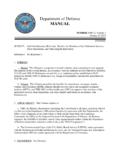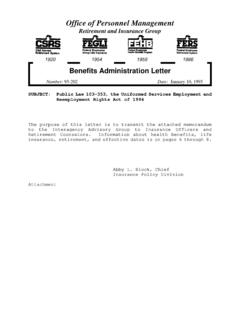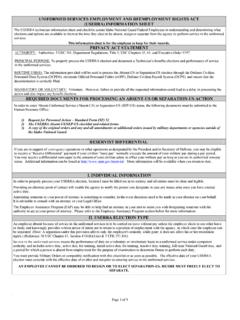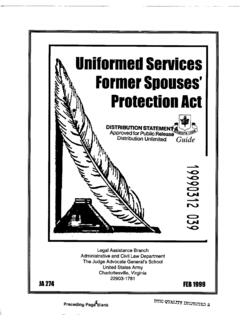Transcription of Uniformed Services Former Spouses’ Protection Act
1 Uniform Senices Fornoer spouses ' P~-ot~c~jon Act: 1s 'I'lxrc 3~0 A?;rch Protect~on for the Fonner Spouse" .. 1 Captortz KYIS~~H~ 1). fiirrzzlr, LiSAi; The ~mied Sen~ices Enlp;oyn.~ent and lieen-7p!oyn1cnI Rig,hls i i' Act of 1994 ..> ..: L icutenant ('olorzel Fl. F,:~p.(~i,o 1Zl(1 ~~SC)YI, LLYAbX After tlic Deal 1s Donc: Debt Ccrilecl~on aild Credit ttepor-rr~lg .. $:# raplcrin ,Trflit. f l*ij,gerz, USAF C'onsumel- Privacy On Thc Illtenlet: it's "Surfer Beware" 1 ? ? -5 .. Jla/oi* R. K~TL ~'LJ?~U~II, [J'S,~F Introduction to Estalc and 7 ax Pldnl~ir~~ Funda~lientals .. i 8'9 [14~il;rjor..Joscpl~ E. Cole, l :S,31; Tht. Deployment J$'ill .. 21 1 C'LI/T~UZT~ ~YZWCSQ -/l.)]]
2 Brur?o, 17S,lf- Uniformed Services Former spouses Protection Act: Is There Too Much Protection for the Former Spouse? CAPTAIN KRISTINE D. KUENZLI* The Uniformed Services Former spouses Protection Act1 (USFSPA) and its amendments provide a number of benefits for Former spouses of military members. The USFSPA was enacted, partly, to recognize the important role the military spouse plays in the military Although the Air Force legal assistance charter does not allow Air Force attorneys to represent members or their spouses in actual divorce proceedings,3 a working knowledge of the benefits available is necessary in order to provide adequate legal guidance before the matter goes to Many members and spouses do not become aware of the benefits available to them upon the dissolution of their marriage until they are in the middle of divorce Furthermore.
3 The numerous provisions of the USFSPA and the time * Captain Kuenzli ( , University of California at Davis; , Gonzaga University School of Law) is an Assistant Staff Judge Advocate at Scott Air Force Base, Illinois. She is a member of the Washington State Bar. 1 Uniformed Services Former spouses Protection Act, Pub. L. No. 97-252, 96 Stat. 730 (1982) (codified at 10 1408, 1447-50, 1072, 1076, 1086 (1994 & Supp. IV 1998)). 2 The legislative history states, [t]he committee received extensive testimony from the Uniformed Services and public witnesses on the contributions and sacrifices made by the military spouse throughout the service member s career.
4 The concept of the military family and its importance to military life is widespread and publicized. Military spouses are still expected to fulfill an important role in the social life and welfare of the military community. S. REP. NO. 97-502, at 6 (1982), reprinted in 1982 1596, 1601. See also Nancy Scannell, We Also Served: The Lot of Former Military Wives; Divorce, WASH. POST, Dec. 18, 1980, at Md. 1. 3 Air Force Instruction 51-504, Legal Assistance, Notary and Preventive Law Programs (May 1, 1996). Air Force practitioners are permitted to and often do provide legal assistance to military members and their spouses who are considering divorce.
5 4 There are numerous articles providing guidance to the practitioner on the USFSPA. See, , Meredith Cohen, Representing the Military Spouse, FLA. BAR J., June 1987, at 117. 5 See David Evans, A Divorce in the Military Can Really Hurt, SAN ANTONIO EXPRESS NEWS, Oct. 5, 1996, at B7; Reg Jones, Former spouses Need to Be Benefit Savvy, FED. TIMES, July 26, 1999, at 17. Former spouses Protection Act 1 requirements for direct payments to Former spouses confuse many military Although the USFSPA was initially enacted in 1982 to rectify what Congress considered an inequity propounded by the Supreme Court s decision in McCarty v.
6 McCarty,7 Congress has frequently amended the USFSPA to provide further protections for the Former spouse. In addition, state courts have interpreted various provisions of the USFSPA in such a way as to protect the Former spouse s interests. Whether the time has now come for Congress to afford further Protection for the military retiree is up for debate. In fact, Congress is currently considering legislation that would attempt to amend the USFSPA to protect retirees interests in their retirement pay. This article will discuss the history of the USFSPA; its current provisions; the relationship between the USFSPA, disability benefits, the Survivor Benefit Plan, the Dual Compensation Act, and pay incentives; the special provisions for domestic abuse cases; and finally, the proposed legislation affecting the I.
7 HISTORY A. Marital Property Law An understanding of the impact of McCarty v. McCarty9 and the USFSPA requires a basic understanding of marital property law. The United States contains eight community property states and forty-two common-law Both of these systems classify property acquired during marriage differently, and therefore, have a great impact on the distribution of assets at divorce. 6 See discussion infra Part IX. 7 453 210 (1981). For a discussion of the facts and holding in McCarty, see infra Part 8 Although not specifically addressed in this article, state law can drastically affect the way in which the USFSPA is applied in divorce proceedings.
8 See Lieutenant Colonel Block, Former spouses Protection Act Update, ARMY LAW., July 1996, at 21 (analyzing state laws concerning the application of the USFSPA). However, since the publication of Lieutenant Colonel Block s article there have been a few state law changes, such as in North Carolina. Previously, North Carolina had a vesting requirement for distribution of marital property. George v. George, 444 449 ( 1994) (holding that since retirement pay was not vested at time of divorce, it was not marital property subject to distribution). In June 1997, the North Carolina legislature enacted a new law that did away with the vesting requirement for division of pensions.
9 535, 1997 Legis. Sess., 212 ( 1997) (codified at GEN. STAT. 50-20(b)(1) (1999)). The statute specifically includes military retirement benefits that are classified under the USFSPA as marital property and are subject to division, and applies to all petitions for equitable distribution filed on or after October 1, 1997. Id. 9 453 210. 10 The eight community property states are Arizona, California, Idaho, Louisiana, Nevada, New Mexico, Texas, and Washington. W. DEFUNIAK & M. VAUGHN, PRINCIPLES OF COMMUNITY PROPERTY 1, 56 (2d ed. 1971). 2 The Air Force Law Review The eight community property states use the Spanish system of marital property known as the ganancial In the ganancial system, all property owned by each spouse prior to marriage or acquired by each spouse separately by gift during marriage is classified as separate property, and all other property acquired during marriage is community Under this system, each member contributes to the community of marriage by equally contributing by his or her industry to its prosperity.
10 And possessing an equal right to succeed to the property after its dissolution. 13 As a result, all income earned during marriage by both members is classified as community property. Furthermore, retirement benefits, considered deferred income, are also considered community property in this As such, military retirement benefits, even unvested benefits,15 are community property assets subject to distribution upon Common-law states17 use an English-derived system of distribution of marital These jurisdictions consider all property owned before marriage, as well as all property acquired during marriage by gift, inheritance, or personal earning, to be owned by each Retirement benefits, whether vested or unvested.











